Marco Polo Marine: Overcoming $16.9m loss: How S’pore marine firm turns tide to own first wind farm vessel designed in Asia
First published in The Straits Times on 6 January 2025.
By shifting its vessel services from oil and gas to offshore wind farms, Marco Polo Marine reinvents itself as a maritime pioneer with Enterprise Singapore’s support.
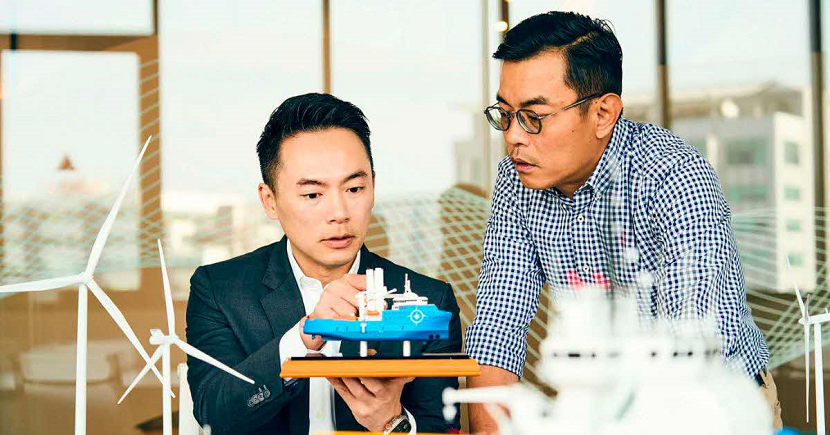
In 2025, Marco Polo Marine will achieve what seemed impossible eight years ago: Christening the first wind farm maintenance vessel designed in Asia.
This US$60 million commissioning service operation vessel (CSOV) represents not just a new venture, but a remarkable comeback for a company that once stood at the brink of collapse.
The path here was far from easy. In 2016, Marco Polo Marine was fighting for survival as oil prices crashed from US$120 (S$161) to US$20 per barrel, devastating its core business of supplying vessels for offshore oil and gas production. The company recorded a $16.9 million net loss as revenue plunged 50 per cent that year.
Chief executive officer Sean Lee recalls: “That was the toughest time of my life. If you read what happened to the offshore marine industry, you will know how many companies went bust.”
Refusing to give up, Mr Lee went searching for investors. “Out of 150 investors, 141 rejected me,” he says. With the support of the nine who said yes, he steered the company through its debt restructuring.
Today, that persistence has paid off. The CSOV is designed to provide technicians safe access to service wind turbines in rough seas, equipped with facilities like a gym and recreation areas.
“Working offshore means being away from home for a month at a time,” Mr Lee, 47, explains. “We need to ensure the environment supports wind technicians.”
With a three-year framework agreement already secured with Danish wind turbine maker Vestas in December 2022, Marco Polo Marine has not only returned to profitability but is charting a new course in maritime operations.
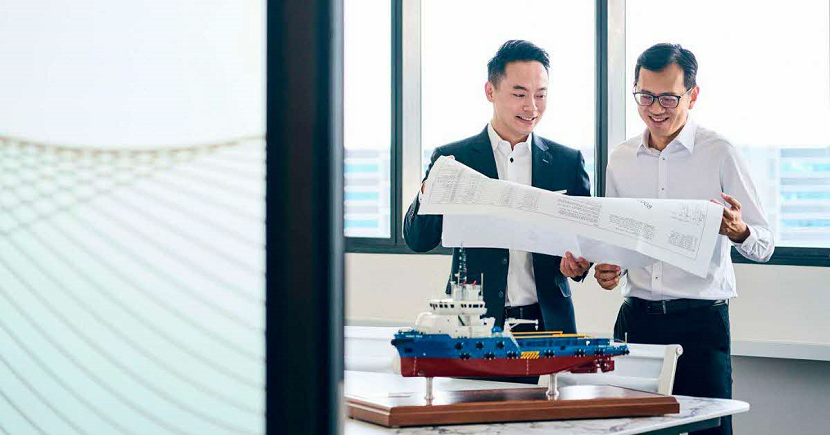
The company recorded a net profit of $21.7 million in 2024, with full-year revenue reaching $123.5 million. Its ship chartering segment alone contributed $71.9 million, up 9.1 per cent from the previous year.
The key for the company was finding stability beyond the volatile oil and gas sector. “The oil and gas sector is a cyclical business and we needed to find something that was more stable,” he says.
His answer came during the pandemic, when he noticed an interesting trend: His vessels were increasingly being chartered for offshore wind farm projects in Taiwan.
The opportunity was clear. According to the European Wind Energy Association, offshore wind turbines are powerful generators of clean energy – a single 3.6 megawatt turbine can produce enough electricity to power over 3,300 homes.
With the global offshore wind market projected to grow at about 22 per cent annually between 2022 and 2030 to reach about US$126 billion, Mr Lee saw his chance to secure the company’s future.
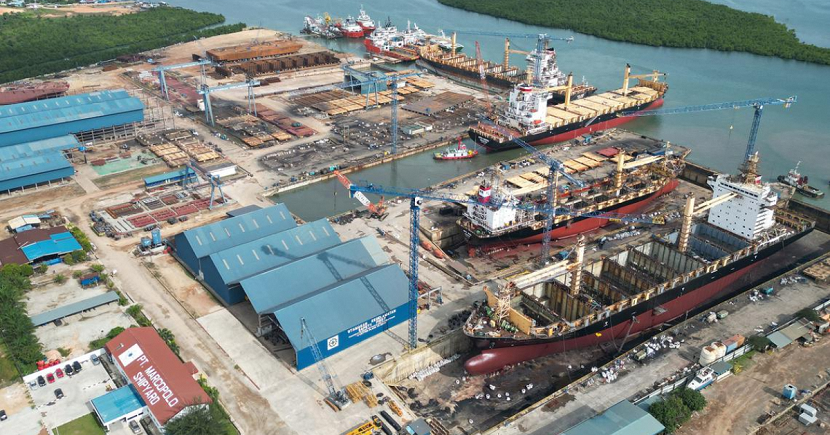
Making global connections
When the firm began expanding into the renewable energy sector, the first step was understanding the Taiwan market, where Mr Lee endured weeks of quarantine during the pandemic so he could visit industry players.
Taiwan’s plans to raise its offshore wind power capacity to 5.7 gigawatts by 2025 – generating 21.5 billion kilowatt-hours of clean energy annually – demonstrated the market’s potential.
In October 2024, Marco Polo Marine joined Enterprise Singapore’s (EnterpriseSG) Scale-Up programme, where it joined nine other companies in sharpening their business growth plans and implementing growth initiatives.
In addition, leaders attend a one-week overseas executive programme and receive coaching to build stronger teams.
Beyond the programme, Mr Lee expanded his market research through EnterpriseSG-facilitated mission trips to the US, UK, Japan and South Korea where he engaged with governments and industry players in the offshore wind sector.
“If you are a Singapore company trying to reach out to stakeholders in these countries, you have to start from ground zero,” he says. “But if you have EnterpriseSG to open doors for you, it’s a lot easier to connect more quickly with regulators and local businesses.”
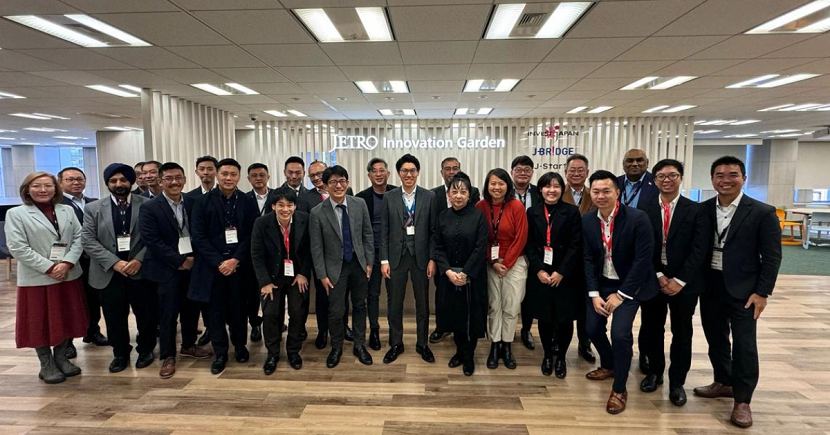
The momentum continued in September 2024 at Wind Energy Hamburg, one of the world’s largest wind energy industry events, where Marco Polo Marine and eight other Singapore companies were invited to attend by EnterpriseSG.
During the event, EnterpriseSG signed an MOU with the Global Wind Energy Council and the Association of Singapore Marine Industries to help home-grown companies tap the growing global offshore wind market.
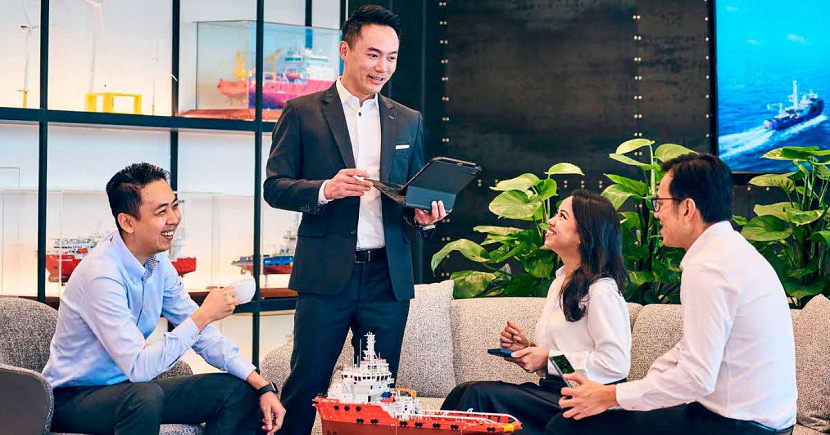
Fueling clean energy
For Mr Lee, leading this transition to support renewable energy marks a new chapter of his family business. It’s a far cry from the company’s humble beginnings in 1991, when Mr Lee’s father, Mr Lee Wan Tang, started Marco Polo Shipping Co Pte Ltd with just three vessels – tugboats and barges transporting building materials from Indonesia to Singapore.
The younger Mr Lee took over the business in 2003 and started the shipyard business, Marco Polo Shipyard Pte Ltd in 2005. Subsequently, he founded Marco Polo Marine Ltd in 2006, which expanded to include offshore operations in 2009.
Seeing the need for specialised vessels in the growing wind energy sector in 2019, Mr Lee began repurposing the offshore service vessels to serve the offshore wind industry, setting the stage for today’s transformation.
As part of its shift to sustainable operations, the company is also exploring cleaner fuel alternatives for maritime operations. EnterpriseSG helped Marco Polo Marine establish a partnership with Amogy in April 2023, a New York-based startup developing zero-emission ammonia-based fuels.
According to the United Nations, maritime industry emissions have increased 20 per cent over the past decade, and Amogy recently achieved a first by powering a tugboat with ammonia fuel.
Before meeting Amogy, Marco Polo Marine had explored different technologies to reduce its environmental impact.
“We considered using drones to transport goods between our vessels and the wind farm supply base,” says Mr Lee, “But there were limitations to that.”
With ammonia technology still developing, the firm is ensuring its new vessels – including the CSOV – can be upgraded to use such fuels in the future.
It is also decarbonising its current operations, including shipyard repairs and recycling activities.
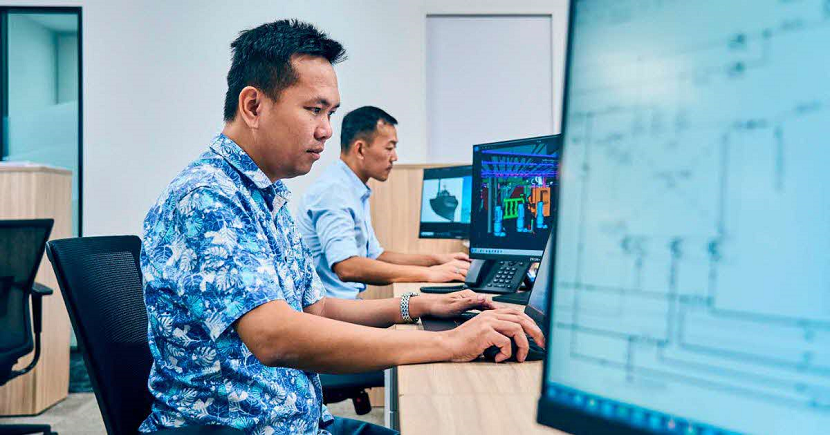
These steps in cleaner maritime operations align with the company’s growing involvement in offshore wind projects, which account for 25 per cent of its revenue.
“This focus on wind power has become our culture,” says Mr Lee. “The whole team knows this is our direction – they have to breathe in and breathe out wind power.”
This is part of a series showcasing how Enterprise Singapore empowers home-grown businesses in their defining moments of growth, helping them transform, innovate and go global. Find out more here.

